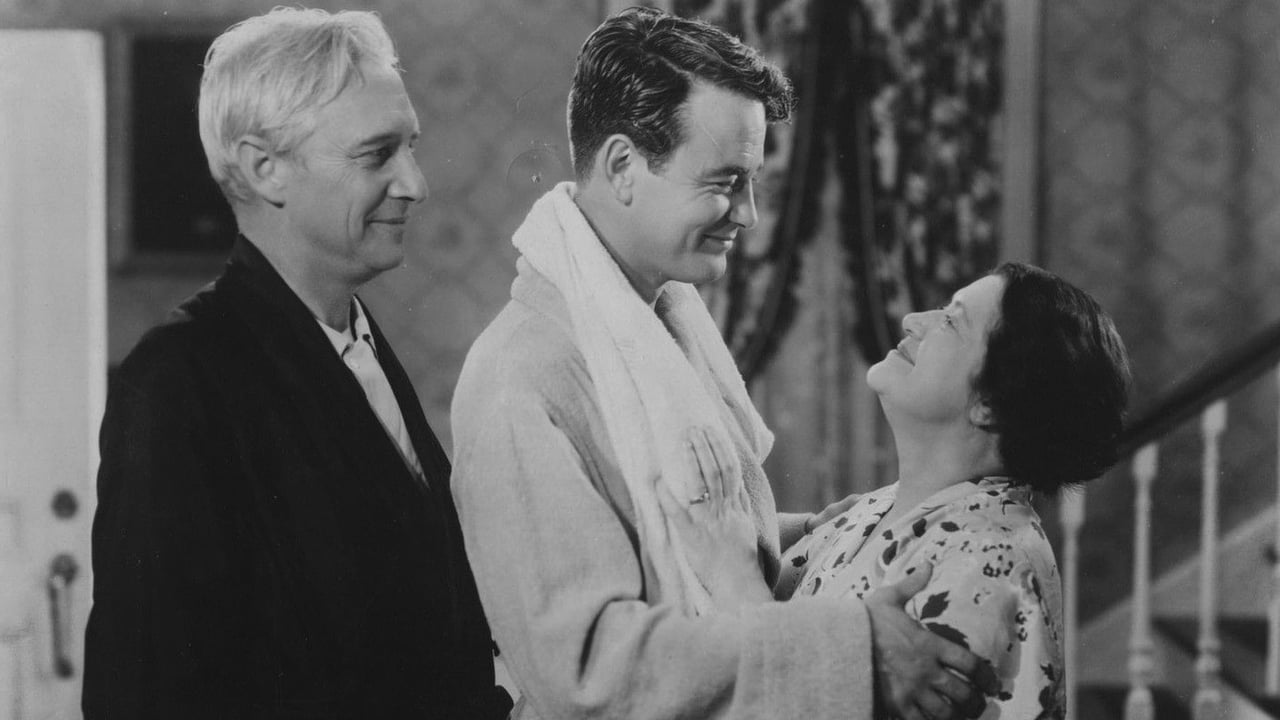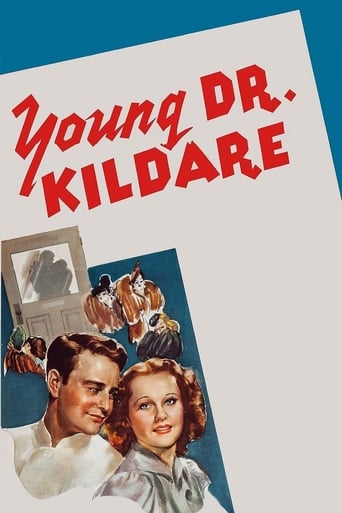Diagonaldi
Very well executed
Breakinger
A Brilliant Conflict
Odelecol
Pretty good movie overall. First half was nothing special but it got better as it went along.
JohnHowardReid
Copyright 12 October 1938 by Loew's Inc. A Metro-Goldwyn-Mayer picture. New York opening at the Radio City Music Hall: 27 October 1938 (ran one week). U.S. release: 14 October 1938. Australian release: 9 February 1939. 8 reels. 81 minutes.COMMENT: Although exceptions were occasionally made for Blondie, Charlie Chan, Sherlock Holmes and The Saint, series films were rarely contenders for even a supporting slot on all-important Saturday nights in Britain and Australia. Dr Kildare had a further impediment in that the setting itself had few glamorous associations for Australians - and still less for Britishers - during the dark days and nights of WW2.This one has some curiosity value, being the first of the M-G-M series. It was also the first feature film directed by Harold S. Bucquet, a graduate of the studio's shorts department. Bucquet's background was in scene design, but his directorial (or perhaps his health) problems surfaced in 1942 when Dr Kildare's Victory had to be completed and largely re-shot by W.S. Van Dyke. On the other hand, Bucquet did such sterling work on The Adventures of Tartu in 1943, he was handed two other prestige assignments, Dragon Seed (1944) and Without Love (1945), before his death in 1946 at the comparatively early age of 54.Alas, Young Dr Kildare is also saddled with a weak script. True, it does have a few interesting moments (Kildare peering through the door at his revived patient), but even some of these are ruined by Bucquet's mawkish tendency to over-emphasize. Only Nat Pendleton's gustoish playing of a muscle-bound ambulance driver and Monty Woolley's stuffed-shirt psychiatrist have any real appeal.
utgard14
Dr. James Kildare (Lew Ayres) is fresh out of medical school and expected to take over his father's small town practice. But Kildare decides instead to go to New York and work as an intern at Blair General Hospital. There he catches the interest of crotchety old Dr. Leonard Gillespie (Lionel Barrymore) and gets into trouble trying to prove a suicidal heiress isn't crazy.The first in MGM's wonderful Dr. Kildare series. Paramount had released a Kildare movie the year prior to this with a different cast but that's unconnected to this series. This movie, like the rest that followed, is a classy medical drama with terrific actors and good writing. Lew Ayres was perfectly cast as the compassionate and idealistic Kildare. As would be the case in most of the series, Lionel Barrymore steals the show as the grumpy but wise Dr. Gillespie, who was so integral to the series' success that when Ayres got the boot during WW2, they handed the series over to Barrymore's Gillespie. Many of the regulars who would make up the fine supporting cast in the series appear here -- Joe the ambulance attendant (Nat Pendleton), Sally the hospital receptionist (Marie Blake), bar owner Mike Ryan (Frank Orth), and hospital administrator Dr. Carew (Walter Kingsford). Samuel S. Hinds and Emma Dunn play Kildare's parents. Nurse Lamont and Molly Byrd don't show up until the next film, though Byrd is mentioned by name in one scene. Solid performances by everybody.It's a great movie that spawned many sequels and a (much) later TV series. Definitely something you will want to see if you're into medical dramas. Overlook the reviewers who nitpick the dated medical knowledge. That's such a ridiculous thing to complain about I can't even wrap my head around it. It's such a shame they didn't have time machines in 1938 so they could make movies that had 21st century knowledge and technology in them. Oh, well, if they had then we wouldn't be able to snark at those old primitives. God knows what a tragedy that would be! Sarcasm aside, I find the "flaws" with the medical stuff part of the appeal of the film. It gives us insight into the way such things were understood back then. That's always been a part of why I love older films -- they provide a window into the past.
moonspinner55
Well-scrubbed medical student from the sticks interns at a New York City hospital and quickly gets on the wrong side of the Chief of Staff, as well as crotchety veteran old Dr. Gillespie (who insults everyone from his wheelchair!). The character of Jimmy Kildare was first introduced in Paramount's "Interns Can't Take Money" from 1937, with Joel McCrea in the role; MGM took over from there, turning the rather ordinary medical scenario into a long-running movie series. Lew Ayres is calm and patient as Dr. Kildare, though his exceptionally sane demeanor comes off as rather maddening alongside the many hotheads who dot the supporting cast (most of whom overact shamelessly). Kildare doesn't even react after his superiors strip him of his duties--instead, he glows with quiet pride in the knowledge that he did his job properly. Lionel Barrymore gives the film a bit of spark and sass as Gillespie, and some of the dialogue is sharp and amusing, but the subplot about a suicidal heiress is ridiculously summed up and topped with an unconvincing bow. ** from ****
mark.waltz
I have to recommend this film highly on daytime soap opera terms, as if you watch the series in sequence, there is a serial like element to the film. James Kildare (Lew Ayres) is the son of a small town Connecticut doctor (Samuel S. Hinds) who assumes he will join him as a partner upon graduating from medical school. But the young Dr. Kildare (hense the title) has already been selected to join the group of interns at New York's Blair Hospital under the watch of two stern taskmasters, chief physician Dr. P. Walter Carew (Walter Kingsford) and the elderly Dr. Leonard Gillespie (Lionel Barrymore), a grumbling and sarcastic medic who has continued his career in spite of bad legs. Now confined to a wheelchair, Dr. Gillespie rolls around, barking at nurses and interns, with only Nurse Molly Byrd (Nell Craig) able to stand up to him. In this film, Molly is a minor character, but once Alma Kruger took over the part in the second film, the character became someone to be reckoned with. Imagine a voice-over, as on soap operas, saying, "The role of Molly Byrd is now being played by.....", as it would have when Lewis Stone took over the role of Judge Hardy from Barrymore in the "Andy Hardy" series.As young Dr. Kildare begins to learn not only his job but the ways of the city he works in as well, he matures greatly, and eventually it is apparent he will have the respect of Dr. Gillespie. Jo Ann Sayers makes her first of two appearances as Ayres' small town love interest, who will fade away once Laraine Day's nurse is introduced in the next film. The presence of Nat Pendleton as the Ambulance assistant and Marie Blake as the Emergency Room receptionist add for all sorts of hilarity. Blake's wisecracking nurse would become famous in the later films for such quotes as "I may work in a hospital, but I don't know anything about medicine. My brother works on a chicken farm, but still can't lay an egg", or "My brother works at the zoo with the monkeys, but can't hang by his tail." My favorite line of hers in the series though was, "They are blaming the hospital for us treating a patient for appendicitis and dying of consumption. When our patients are treated for appendicitis, they die of appendicitis!" (The quote may not be right on, but you get the idea....) As for Gillespie, Barrymore will steal every single scene he is in. As Ayres discovers, Gillespie may seem like a mean old grump, but he has his own agenda, which includes Kildare in every detail. Barrymore in this series is a treasure. Kildare's parents (Samuel S. Hinds and Emma Dunn) are his own Ma and Pa Hardy, typical of Louis B. Mayer's homage to the American parents, and will make appearances in several of the films. The big medical crisis in this film involves a young suicidal socialite whom Ayres must find a reason to bring to her to continue to have the will to live. How he does it is quite interesting and is a nice set up for what the rest of the series (even the later ones without Dr. Kildare) would have to live up to.

